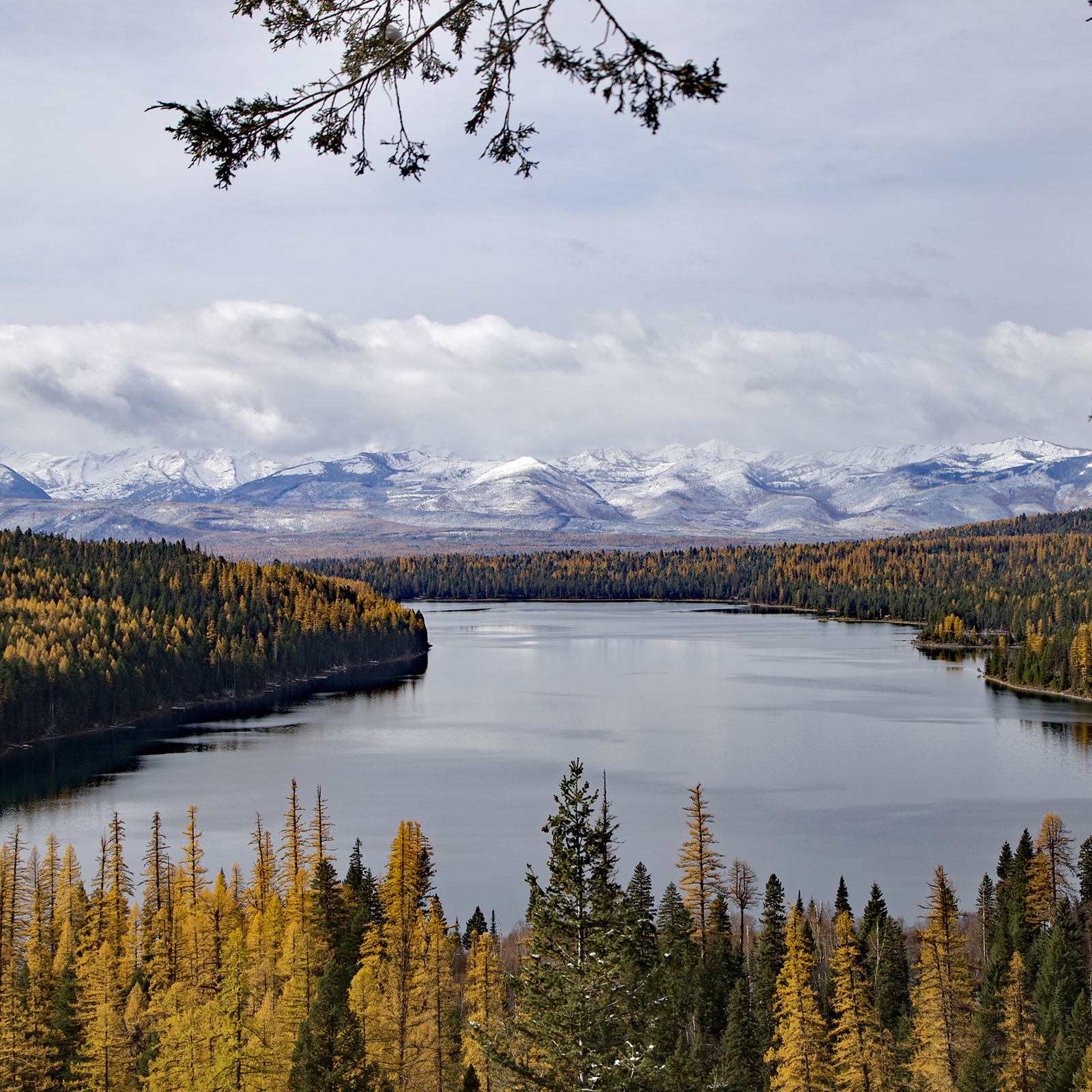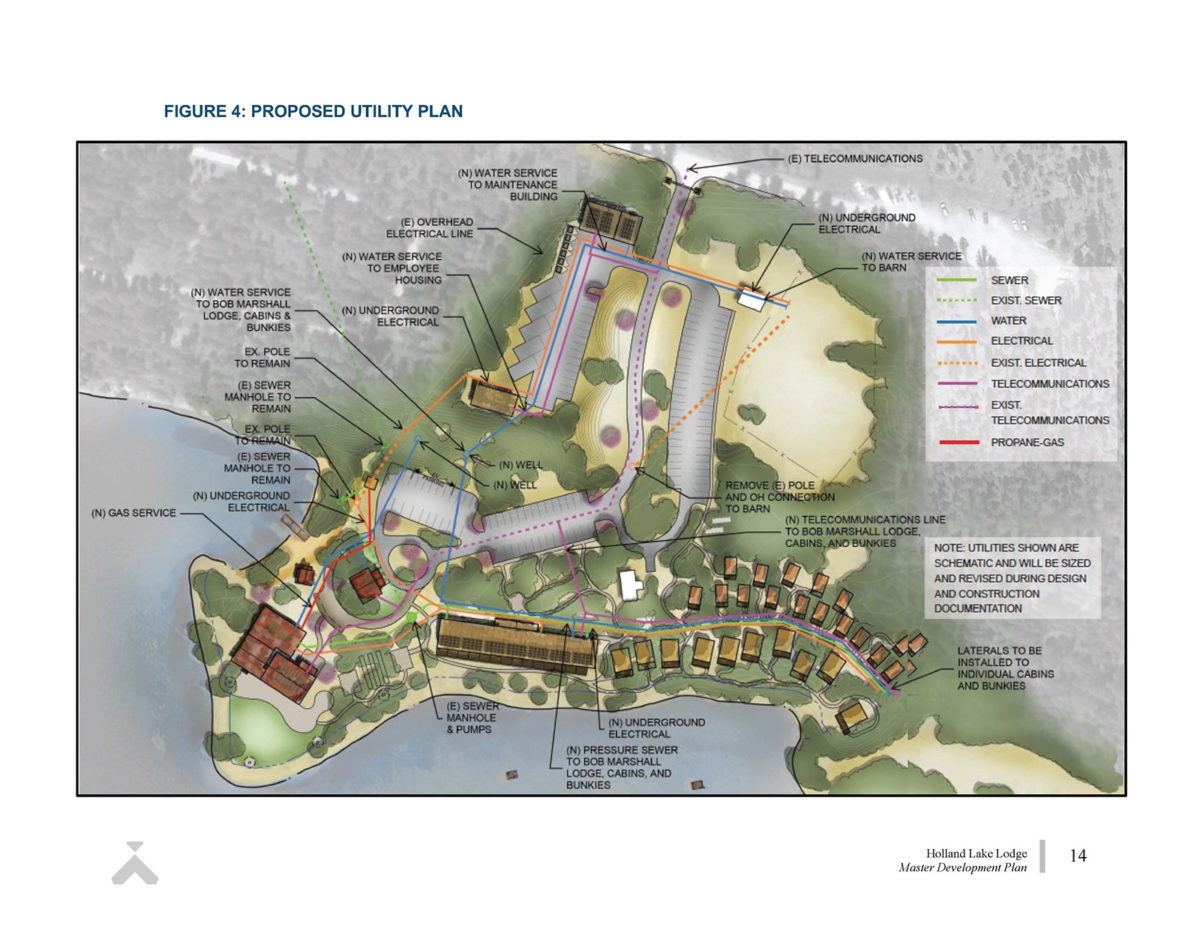Under New Ownership, Holland Lake Lodge Seeks Expansion Approval from Flathead Forest
The proposed project would triple the occupancy of the historic lodge, prompting calls by a conservation group for a more stringent standard of environmental review
By Tristan Scott
Under new ownership by the Park City, Utah-based ski resort company POWDR, the century-old Holland Lake Lodge is seeking to expand and upgrade its historic facilities in the Swan Valley through a special-use permit from the Flathead National Forest.
Originally built in 1924, Holland Lake Lodge is a rustic lakeside resort located south of Condon. Operated by Holland Lake Lodge, Inc., the facility operates under special-use permit authority from the U.S. Forest Service (USFS), similar to that of a ski resort operating on public land, and it was last updated in 1947 after a fire razed the original structure.
According to the owners, including new joint venture partner POWDR, one of the largest ski resort operators in North America, the facility “is in need of some preservation work, which would include modern comfort upgrades for a sustainable future.” The proposed expansion would provide overnight accommodations for 156 guests, scoping documents explain, more than tripling the current availability within the existing 15-acre permit area.
The expansion would include construction of a new 28-room, two-story, 13,000-square-foot lodge, as well as 10 lake cabins pegged at 650 square feet each. The proposal also calls for 16 smaller studio cabins at 250 square feet each; a new 2,000-square-foot welcome center; a 3,000-square-foot restaurant; a small watersport building; and new support buildings, including a 2,000-square-foot maintenance building and a 2,000-square-foot building for employee housing.

Upgrades to water and wastewater systems, electrical utilities and fiberoptic internet service would be included in the expansion, according to the scoping documents.
The Holland Lake Lodge currently consists of the old lakefront lodge, a gift shop, six cabins, and a manager’s cabin. In total, the property can accommodate 50 overnight guests, 12 employees and the manager.
With construction on the expansion project tentatively slated to begin next year, and with full project implementation anticipated in one to five years, the facility would initially be operated during the summer season only; however, all new buildings would be winterized “in anticipation of sufficient demand to operate during winter season,” approximately Nov. 20 to Jan. 15 annually.
According to Flathead National Forest Supervisor Kurt Steele, the existing facilities are inadequate to keep up with the growing demand for recreation amenities on public land, and the proposed improvements align with recreation uses permitted in the area.
“Due to an increase of people visiting and living in the Swan and Flathead Valleys, it is desirable to upgrade public facilities and enhance access to the outdoors in areas of the Flathead National Forest designated for focused recreation activities,” according to Steele’s scoping letter.
Although much of the improvements will only benefit paying guests to the resort, the proposal does call for improved connectivity to public trails and the expansion of the East Holland Lake Connector Trailhead, located adjacent to the lodge property.
“Improvements would provide a family friendly destination with the modern comfort and conveniences that visitors, today, expect, while retaining the integrity of location,” according to a news release from the Flathead National Forest, which on Sept. 8 held a public forum at Holland Lake Lodge to gather input.
Architecture elements would reflect the Adirondack design commonly used in dude ranches, lodges, and resorts across Montana, the release states. Environmental best practices would also be implemented, including water and energy conservation measures; increased fire safety; shoreline protection and natural vegetation cover; protection of the night sky; bird and waterfowl protection measures; and the Lodge would offer wildlife awareness and conservation material for guests, to name a few.
“I have managed Holland Lake Lodge for 20 years and it is a truly special place where people have come to recreate for nearly 100 years, but for Holland Lake Lodge to thrive, the resort needs some T.L.C,” Christian Wohlfiel, owner of Holland Lake Lodge, said in a prepared statement. “This project is intended to preserve the spirit and integrity of what is here, while upgrading facilities so we can share this place with guests for years to come.”
“POWDR has built its brand on the premise of delivering soulful experiences that matter to guests and reflect the local community,” according to a statement from Justin Sibley, CEO of POWDR. “Holland Lake Lodge is a soulful place, where families spend time in the outdoors with the people they love. We look forward to continuing this legacy.”
The Flathead National Forest began soliciting public comment on Sept. 1 and is asking to receive comments by Sept. 21. That narrow timeframe, coupled with the Forest’s determination that the project can be categorically excluded from further analysis and documentation required by an Environmental Impact Statement or Environmental Assessment, has prompted pushback from a local conservation group, the Swan View Coalition.
According to Keith Hammer, chair of the Swan View Coalition, the Holland Lake Lodge Master Development Plan was not made publicly available on the Flathead National Forest’s website until Sept. 6, and the public deserves more time to review the lengthy scoping documents.
“The mega-development would be allowed under a Special Use Permit for 15 acres of public land, will dwarf the historic lodge and will destroy the rustic natural character of Holland Lake and the upper Swan Valley,” Hammer stated on his group’s website.
In pressing federal regulatory officials for a more rigorous standard of review, Hammer said the Flathead National Forest is “dead wrong to presume this mega-development can be ‘categorically excluded’ from the prior preparation of an Environmental Assessment or Environmental Impact Statement. Such short cuts are intended for constructing an outhouse or a tool shed, not a destination resort.”
For more information on the proposal and to submit public comments, visit the Flathead National Forest’s project website.